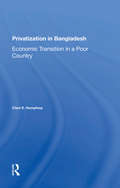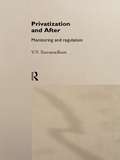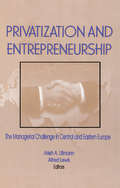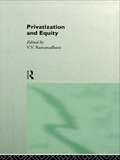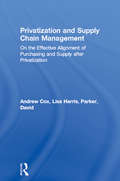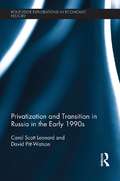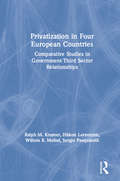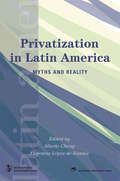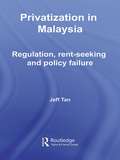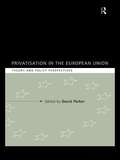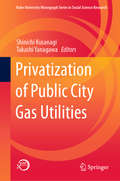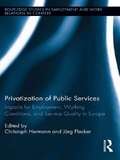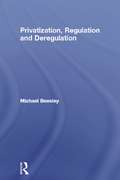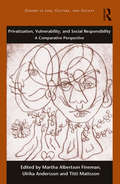- Table View
- List View
Privatisering in Pakistan: Uitdagingen en respons
by Shahid Hussain RajaZonder technische termen en geschreven in een gemakkelijk te lezen taal, is dit korte boek bedoeld voor algemeen lezerspubliek, met name voor degenen die moeten weten wat er gebeurt is met de privatiserings-inspanningen in Pakistan nadat de Pakistan Muslim League in 2013, een bedrijfsvriendelijk regime, aan de macht kwamen. Dit korte e-book is een uitgebreide versie van mijn artikel "Privatisering in Pakistan" dat ik schreef kort na mijn pensionering als Federaal Secretaris van de regering van Pakistan, ministerie van privatisering in 2012. Het trok veel aandacht, wat me ertoe aanzette een volwaardig boek te schrijven over de geschiedenis van privatisering in Pakistan en andere gerelateerde kwesties, inclusief de vooruitzichten en de uitdagingen waarmee het op korte tot middellange termijn zal geconfronteerd worden. Behoefte aan privatisering Over het algemeen heeft de staat een of meer van de volgende privatiseringsdoelstellingen; 1. versterking van de privé sector. Dit was de drijfveer achter de eerste generatie van privatiseringen die in 1960 in Pakistan werd uitgevoerd, toen de staat fabrieken bouwde in strategische sectoren en deze tegen zeer nominale tarieven overdroeg aan de zakenlieden die terughoudend waren om in deze sectoren te investeren vanwege een gebrek aan vereiste middelen tot hun beschikking en hoge risico's. 2. Verbetering van de efficiëntie en dienstverlening van staatsbedrijven, al dan niet winstgevend, door het stimulerings- en beloningsmechanisme in te voeren van de privé sector die kapitaal, technologie en betere beheerspraktijken zou inbrengen. Pakistan privatiseerde het grootste deel van zijn staatsbedrijven tijdens de privatisering van de tweede generatie in de jaren tachtig en negentig. 3. Elimineren / verminderen van de enorme overheidssubsidies die worden gegeven aan staatsbedrijven die voortdurend verliezen lijden, maar die niet kunnen worden gesloten vanweg
Privatización en Pakistán
by Shahid Hussain RajaAunque Pakistán haya estado llevando a cabo la privatización de empresas estatales por más de 50 años, la privatización de cualquier empresa siempre genera discusiones acaloradas, normalmente centradas alrededor de cuatro problemas/necesidades y beneficios, intereses de los empleados, bienestar del consumidor y transparencia. Mientras que sus autores lo apoyan por reducir subsidios estatales y lograr ganancias por eficiencia, sus adversarios se oponen por sacrificar bienestar público, “vender la plata familiar” (deshacerse de algo valioso en búsqueda de una ventaja, a pesar de que sea conveniente resguardarlo), y crear monopolios privados. Incluso aquellos, que son no partidistas en este debate, aconsejan precaución y argumentan que este proceso debería ser estrictamente evitado en el caso de monopolios naturales y de activos estratégicos como recursos naturales. Dejando de lado el debate, el hecho que la privatización es una parte integrante de la agenda general de la liberación y desregulación económica. Abriendo la economía a la competición, la liberación económica puede remover ineficiencias estructurales y falsas barreras creadas por el estado a la competencia. Eso es lo que se necesita y está pasando en Pakistán ahora. Este corto Libro digital es una versión ampliada de mi artículo “Privatización en Pakistán”, el cual escribí poco después de mi jubilación como secretario federal del Gobierno de Pakistán, Ministerio de Privatización en 2012. Atrajo un montón de atención y me impulsó a escribir un libro de pleno derecho sobre la historia de la privatización en Pakistán y otros problemas relacionados incluyendo sus porvenires y los desafíos que iba a enfrentar en el corto a mediano plazo.
Privatization In Bangladesh: Economic Transition In A Poor Country
by Clare E HumphreyBangladesh, the world's poorest large country, has privatized more state-owned industries than any other developing nation. This policy-orientated study traces Bangladesh's economic fortunes in its British, Pakistani and independent periods. Around the theme of a traditional society coping with modernization, the study analyzes in depth the effects
Privatization and After: Monitoring and Regulation
by V. V. RamanadhamPrivatization and After discusses the need to monitor privatization. The authors argue that monitoring will show whether or not the process is fulfilling its objectives and contributing to improved economic performance. The book also assesses the need for, and techniques of, regulating privatized enterprises in situations of continuing monopoly or significant market control. This is supported by an in-depth analysis of regulation in the UK and its implications for developing countries. Further illustrative material is drawn from a range of developed, developing and former socialist countries.
Privatization and Entrepreneurship: The Managerial Challenge in Central and Eastern Europe
by Alfred Lewis Erdener Kaynak Arieh A UllmannPrivatization and Entrepreneurship: The Managerial Challenge in Central and Eastern Europe analyzes the challenges faced by managers in the transforming economies of Central and Eastern Europe and provides penetrating insights into the details of managing in the former socialist countries. This collection’s combination of conceptual/theoretical material with empirical, firsthand case analysis prepares Western managers for a more profitable and less stressful entry into these significant markets.This enlightening book highlights the complexity and breadth of the issues and problems of successfully entering new markets in Central and Eastern Europe. Along the way, you are introduced to such topics as consumer behavior and shown the different forms of foreign direct investment with their associated problems and benefits. If you are searching for ways to better prepare for business in these markets, this book can help you meet your objectives with its helpful information on: ethical concerns and linguistic difficulties of managing in transforming economies management challenges of privatization management challenges of entrepreneurship strategic issues associated with the reorientation of enterprises corporate constituencies, changing consumers, labor unions, and pay practicesPrivatization and Entrepreneurship will prove valuable to policymakers in economic development and foreign aid agencies, executives of companies planning to expand into Europe and those already active in the region, and academicians and students in management, economics, and political science.
Privatization and Equity
by V. V. RamanadhamPrivatization and Equity, the contributors look at some of the problems brought about by the change to private ownership. They identify factors which can lead to greater inequality, including changes in market structure, foreign ownership and operating policies. They also highlight the consequences of ignoring considerations of equity. In the short
Privatization and Public Enterprises
by Richard Hemming Ali M. MansoorA report from the International Monetary Fund.
Privatization and Structural Adjustment in the Arab Countries
by Said El-NaggarA report from the International Monetary Fund.
Privatization and Supply Chain Management: On the Effective Alignment of Purchasing and Supply after Privatization (Routledge Studies in Business Organizations and Networks)
by Lisa Harris David Parker Andrew CoxThis book brings together two of the 'hottest issues' in current management thinking: the impact of privatization on the performance and behaviour of the companies involved, and the increasingly important role of purchasing and supplier relationships. The notion that efficiency is improved with privatization is critically examined. The authors examine whether privatized organizations have recognized the importance of the procurement role and developed both their procurement functions and supplier relationships so as to enhance competitiveness. Grounded in economic theory, and providing rich case study material, this volume makes a major contribution to an increasingly important area. It will be of interest to students and researchers in economics, business and management studies.
Privatization and Transition in Russia in the Early 1990s (Routledge Explorations in Economic History)
by David Pitt-Watson Carol Scott LeonardFew economic events have caused such controversy as the privatization process in Russia. Some see it as the foundation of political and economic freedom. For others it was economics gone wrong, and ended in "Russians stealing money from their own country". As Russia reasserts itself, and its new brand of capitalism, it is ever more important that policy makers and scholars understand the roots of the economic structure and governance of that country; what was decided, who made the decisions and why, what actually transpired, and what implications this has for the future of Russia. This work, written by two senior advisors to the Russian government, has unique access to documentation, tracking the decision making process in the Russian Mass Privatization process. By close reference to events, and supplemented by interviews with many of the key participants, it shows that the policies adopted were often influenced and shaped by different forces than those cited by current popular accounts. The book challenges the interpretation of Russian privatization by some of the West’s most eminent economists. It underlines that economists of all schools, who bring assumptions from the West to the analysis of Russia, may reach false or misleading conclusions. It is an essential guide for anyone interested in Russian economic reform, and anyone who seeks to understand this enigmatic country, and its actions today.
Privatization in Eastern Germany: A Neo-Institutional Analysis
by Herbert BrückerThis text gives an analysis of privatization and restructuring by the Treuhandanstalt in East Germany. It also addresses the theoretical and conceptual problems of large-scale privatization in the transformation process.
Privatization in Four European Countries: Comparative Studies in Government - Third Sector Relationships
by Ralph M. KramerThis book has a dual focus: on how four countries use voluntary non-profit organizations to provide services to the physically, mentally, and sensorially handicapped; and on the changing role of the voluntary, or "third," sector in welfare states. At the same time, it is also a comparative study of privatization in the special sense of using nongovernmental organizations to implement public policy. Most comparative studies of the welfare state have neglected this form of "indirect public administration" because researchers have usually conceived of government as monolithic and consequently overlook the frequent separation of financing from the delivery of public services.
Privatization in Latin America: Myths and Reality
by Alberto Chong Florencio Lopez de SilanesPrivatization is under attack. Beginning in the 1980s, thousands of failing state-owned enterprises worldwide have been turned over to the private sector. But public opinion has turned against privatization. A large political backlash has been brewing for some time, infused by accusations of corruption, abuse of market power, and neglect of the poor. What is the real record of privatization and are the criticisms justified? 'Privatization in Latin America' evaluates the empirical evidence on privatization in a region that has witnessed an extensive decline in the state's share of production over the past 20 years. The book is a compilation of recent studies that provide a comprehensive analysis of the record of and accusations against privatization, with important recommendations for the future.Seven countries are investigated: Argentina, Bolivia, Brazil, Chile, Colombia, Mexico, and Peru. This book will be vital to anyone interested in the privatization debate but especially to those involved in civil service reform, corporate governance, economic policy, finance, and anticorruption efforts. 'Privatization is important but controversial. While economists typically favor it, others are skeptical. This book provides strong scientific evidence that privatization has been beneficial for many Latin American countries, although some privatizations failed and some groups in society lost out. As usual, the devil is in the details: how privatization is carried out and what reforms accompany it are crucial to its success. The book is definitely an invaluable contribution to the privatization debate.' --Oliver Hart, Andrew E. Furer Professor of Economics, Harvard University
Privatization in Malaysia: Regulation, Rent-Seeking and Policy Failure (Routledge Malaysian Studies Series)
by Jeff TanIn recent years, privatisation has fallen out of favour in many countries because the underlying political factors have not been well understood. This book examines Malaysia’s privatisation programme, focusing on how political constraints resulted in the failure of four major privatisations: the national sewerage company (IWK), Kuala Lumpur Light Rail Transit (LRT), national airline (MAS), and national car company (Proton). It considers why developing countries such as Malaysia might want to embark on privatisation, the factors that lead to policy failure, and what is needed to make it work. It shows clearly that political motives driving privatisation often dominate purely economic considerations, and thus it is necessary to analyse privatisation within the specific country context. It argues that failure in the Malaysian case was due to political considerations that compromised institutional design and regulatory enforcement, leading to problems associated with corruption. It concludes that privatisation does not necessarily improve incentives for efficiency or enhance the finance available for capital investment, and that successful privatisation depends on the state’s institutional and political capacity to design and manage an appropriate set of subsidies. Overall, this book is a comprehensive examination of privatisation in Malaysia, providing important insights for understanding the political economy of this process in other developing countries.
Privatization in Transition Countries
by Donal Mcgettigan Oleh HavrylyshynThe authors' view is that any privatisation is better than none, regardless of whether a stable, competitive environment has been established first. However, private companies started from scratch perform best, followed by newly privatised firms run by outsiders, either local or foreign. Privatised companies dominated by insiders do less well, but even they regularly outperform state enterprises. Without an appropriate market environment though, managers may spend more time lobbying the government for support than undertaking painful restructuring measures.
Privatization in the European Union: Theory and Policy Perspectives
by David ParkerThe book identifies different national characteristics in terms of the motivation to privatise, the scale of privatization and its consequences. In the opening chapters there is a detailed overview of the theoretical economic issues involved in privatisation and an assessment of privatization across the EU. The remaining ten chapters contain national case studies of EU countries which review the history of state ownership and privatization in each of these countries and evaluate the extent of privatisation. The role of European Commission directives in deregulating markets and stimulating privatisation is also examined.
Privatization of Anatolia National Telekom: General Instructions for All Simulation Participants
by Michael D. Watkins Paul Vaaler Burkhard Schrage Banu OzcanAnatolia National Telekom is a multiparty negotiation simulation patterned after the Turkish government's aborted attempt to privatize its state-owned telecommunications monopoly, Turk Telekom, in late 1997. Provides participants with an opportunity to identify and negotiate complex issues related to the valuation and sale of a state-owned enterprise in an emerging market. Members of each negotiating team are valuing a 20% equity stake being offered by three "selling" teams to three prospective "buying" teams representing different types of foreign investors.
Privatization of Public City Gas Utilities (Kobe University Monograph Series in Social Science Research)
by Shinichi Kusanagi Takashi YanagawaThis book is a study on the Japanese city gas industry, which has been rapidly liberalized in recent years. Especially, it focuses on the background, reasons, methods, and effects of the privatization of publicly owned city gas utilities in Japan. In Japan, after the Great East Japan Earthquake, the liberalization of the electric power and gas business has progressed rapidly. There are a number of studies on the reform of Japan's electricity market, but there are few studies on city gas business. This book describes the state of Japan's public city gas utilities and the necessity of their privatization. And it explains the role of concession as a method of privatization. Then it verifies that the effects of past privatization cases are insufficient. The book also covers deregulation of public utilities in Europe, which triggered Japan's liberalization of its energy and other public utility sectors, and privatization of electricity and gas businesses in India, a developing country in Asia. Finally, this book explores future regulation and business of city gas industry. Pipeline network should be regulated to comply with future unbundling starting from 2022, and gas business altogether with electricity and water businesses need more digitization.
Privatization of Public Services: Impacts for Employment, Working Conditions, and Service Quality in Europe (Routledge Studies in Employment and Work Relations in Context)
by Jörg Flecker Christoph HermannPublic services throughout Europe have undergone dramatic restructuring processes in recent years in connection with liberalization and privatization. While evaluations of the successes of public services have focused on prices and efficiency, much less attention has been paid to the impacts of liberalization and privatization on employment, labor relations, and working conditions. This book addresses this gap by illustrating the ways in which liberalization has contributed to increasing private and foreign ownership of public services, the decentralization of labor relations has amplified pressure on wages, and decreasing employment numbers and increasing workloads have improved productivity partly at the cost of service quality. Examining diverse public-service sectors including network industries, public transportation, and hospitals, and using international case studies, Privatization of Public Services covers a wide range of aspects of service provision, with particular emphasis on companies and workers. The result is a unique picture of the changes created by the liberalization processes in Europe.
Privatization of Rhone-Poulenc--1993
by Peter Tufano Donald S. CollatIn mid-1993, representatives of Rhone-Poulenc, a leading nationalized French firm, worked with the French government to plan the imminent privatization of the firm. One aspect of the privatization was to create incentives for employees to buy and hold shares in the firm. A partial privatization earlier in 1993 proved that workers were reluctant to hold equities, even after receiving discounts and subsidized financing. The key financial officers of the firm received a proposal from Bankers Trust that would offer employees a unique investment in the firm, which might increase employee participation in the share offering. This alternative would guarantee employees a minimum rate of return yet allow them to enjoy appreciation of the firm's shares. The financial officers have to decide whether to propose this employee stock ownership alternative to the French government and to Rhone-Poulenc's board for inclusion in the forthcoming privatization.
Privatization of the Power Sector in Nigeria (A)
by Eric Werker Olatomiwa Igun Alice Wei Onyechi EzekwuecheIn spite of its abundant energy resources, Nigeria in 2012 had one of the lowest levels of energy use in the world. Self-generation of power from costly generators was double that of grid-supplied electricity. The history of its power sector was one of inefficient monopolies, missteps, and corruption. But a wholesale change to the market, designed under reformist President Obasanjo and pushed forward by President Jonathan, promised greater efficiencies and investment guided by private-sector principles including widespread privatization, pricing reforms, and reliance on firms to produce and distribute the electricity. Power producer firms on the sideline needed to decide whether they wanted to be a part of this new market.
Privatization of the Power Sector in Nigeria (B)
by Eric Werker Olatomiwa Igun Alice Wei Onyechi EzekwuecheSupplement for case 713042
Privatization, Regulation and Deregulation
by Michael BeesleyIn this second edition of Privatization, Regulation and Deregulation, the author has updated and augmented the original material to take account of developments over the last 5 years. This volume includes ten completely new chapters and coverage of the critical period from 1981to the present. The book provides a unique insight into the privatization and regulatory procedure. In addition, it presents a significant contribution to the basic economic arguments underlying these reforms to practitioners involved in privatization and regulation.
Privatization, Vulnerability, and Social Responsibility: A Comparative Perspective (Gender in Law, Culture, and Society)
by Martha Albertson Fineman Ulrika Andersson Titti MattssonTaking a cross-cultural perspective, this book explores how privatization and globalization impact contemporary feminist and social justice approaches to public responsibility. Feminist legal theorists have long problematized divisions between the private and the political, an issue with growing importance in a time when the welfare state is under threat in many parts of the world and private markets and corporations transcend national boundaries. <p><P> Because vulnerability analysis emphasizes our interdependency within social institutions and the need for public responsibility for our shared vulnerability, it can highlight how neoliberal policies commodify human necessities, channeling unprofitable social relationships, such as caretaking, away from public responsibility and into the individual private family. This book uses comparative analyses to examine how these dynamics manifest across different legal cultures. By highlighting similarities and differences in legal responses to vulnerability, this book provides important insights and arguments against the privatization of social need and for a more responsive state.
Privatização no Paquistão: desafios e resposta
by Shahid Hussain Raja Gisely GanozaEste pequeno EBook é uma versão expandida do meu artigo "Privatização no Paquistão", que eu escrevi logo depois da minha aposentadoria como Secretário Federal do Governo do Paquistão, Ministério da Privatização em 2012. Sua publicação atraiu muita atenção, me pedindo que escrevesse um documento completo, um livro sobre a história da privatização no Paquistão e outras questões relacionadas, incluindo suas perspectivas e os desafios que enfrentará em curto e médio prazo. Desprovido de termos técnicos e escrito em um idioma fácil de ler, este pequeno livro é para leitores em geral, particularmente para aqueles que precisam saber o que está acontecendo com os esforços de privatização do Paquistão depois de entrar no poder um regime favorável às empresas, a Liga Muçulmana do Paquistão, em 2013.


